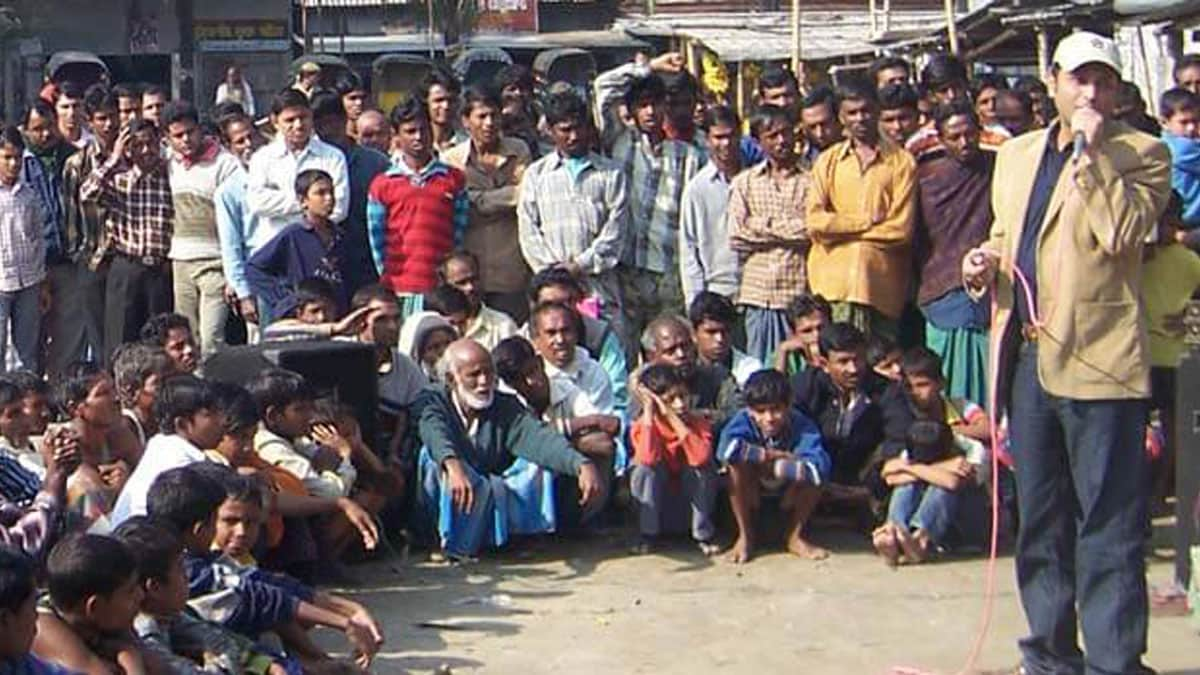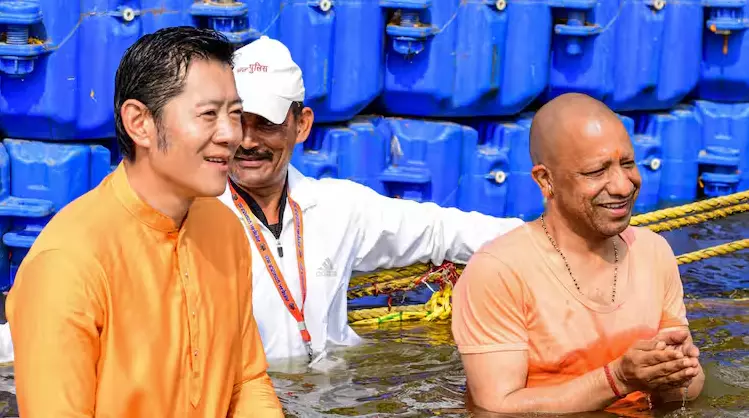
Devasish Sharma, a bureaucrat by profession, made headlines in May 2020 when he undertook an extraordinary 2,731 km road journey from Mumbai to Guwahati. Leading a convoy of six buses, he accompanied 132 people—65 of whom were cancer patients, with the rest being their attendants. Among them were 40 women, including both patients and caregivers, as well as six children who had recently undergone surgery at Narayana Hrudayalaya in Mumbai.
Despite the blistering summer heat, the looming threat of Covid-19, and the risk of medical emergencies, the entire group reached Guwahati safely—thanks to the resilience of the patients, the dedication of the attendants and bus staff, and the unwavering determination of Sharma. At the helm of this mission was Sharma, Assam’s joint resident commissioner in Mumbai, who went above and beyond his administrative responsibilities to personally accompany and care for the 132-member convoy. His commitment was so profound that, when no medical staff were willing to assist due to fears of Covid-19, Sharma took it upon himself to administer injections, following remote guidance from doctors.

Currently the district commissioner of Morigaon, Assam, Sharma is a man of many talents. An avid musician, he also runs the Deephika Foundation, an NGO with an inspiring origin story. Additionally, he is the founder-chairman and trustee of Deepsikha, a trust dedicated to cancer care.
The birth of Deepshika “This was way back in 2003 when I was posted to Mumbai. When I arrived, the Assam Bhavan was in a very dilapidated condition, and I was asked to go and establish a normal guesthouse. As you know, Assam Bhavans cater to VIPs, VVIPs, tourists, and people from the state who visit for various purposes.
“When I met the Assamese diaspora in Mumbai, I realised that many people from Assam, especially patients seeking treatment at Tata Memorial Hospital, faced a harrowing time finding accommodation. At that time, accommodation near Tata Hospital cost around Rs 600 per day, including food, transport, and other expenses,” Sharma said over the phone as he was getting ready to conduct a cancer detection programme in a remote area of his district. “I visited Tata Hospital and spoke with many patients from Assam.
They told me that one of their biggest challenges was accommodation, as many of them had to sell their land and property to afford treatment. Back then, the situation was very different from today. “Hospitals in Assam were not as well-equipped or sophisticated as they are now, and many patients preferred to come to Mumbai for treatment.
While some still do, the numbers have significantly decreased. “We proposed to the government that Assam Bhavan be dedicated to assisting these cancer patients who struggled to find accommodation in Mumbai. Although we did not receive an official order, many senior officials and influential people supported the decision.
As a result, Assam Bhavan, Mumbai, was dedicated to cancer patients, and it continues to serve that purpose even today,” he said. Sharma quickly realised that leading the Assam Bhavan in Mumbai was not just a professional responsibility but a call to humanity that he simply could not ignore. “I believe that is the only government Bhavan in the entire country that is entirely dedicated to cancer patients.
However, once the Bhavan started operating, we began facing many challenges because a single cancer patient would occupy a room for the entire duration of their treatment. “In the case of blood cancer, for instance, a child undergoing treatment for ALL (acute lymphoblastic leukemia) would need to stay for at least 8 to 10 months. Similarly, for other cancers, during the entire period of chemotherapy, radiotherapy, or post-surgery recovery, a patient needed to stay for around 3 to 4 months.
As a result, each room would be occupied for no less than 3 to 4 months, leading to a scarcity of available accommodation,” the Morigaon district commissioner said. “This created the need for additional accommodation and various services such as blood and platelet donation, transportation, financial assistance, and more. I realised that within the framework of government service, it would not be possible to provide everything required.
So, I decided to start an organisation, and that is how Deepsikha was born. “I sought special permission from the government because, as government officers, we are required to inform the authorities before starting an NGO or getting involved in such initiatives. At that time, Jishnu Barua was the secretary of personnel (later retired as Assam chief secretary), and I obtained permission from him to begin the work.
That is how Deepsikha was established,” Sharma recalled, describing how Deepshika came to life as a ray of hope. Deepshika: Light of the lamp ‘Deepshika’ is a Sanskrit term that translates to “flame of light” or “light of the lamp”. It symbolises enlightenment, hope, and the spread of knowledge, often evoking a sense of guidance and illumination in a metaphorical sense.
True to its name, it became a beacon for cancer patients who tend to lose hope rather quickly. “It started with the establishment of a cancer shelter for patients in a place called Masjid Bandar, which is very close to the Chhatrapati Shivaji Terminus. During that time, many patients sought treatment at Prince Aly Khan Hospital, where a renowned doctor, Dr Sultan Pradhan, practiced, along with Dr Tapan Saikia.
“Since Dr Saikia is from Assam, many patients preferred to consult or be treated by him because they had the comfort of speaking in their mother tongue. Dr Pradhan, as we all know, is globally recognised for his expertise in head and neck surgeries. From Assam, we had numerous cases of head and neck cancer, oesophageal cancer, and, among women, cervical and breast cancer,” Sharma said.
Although Tata Memorial Hospital offers more affordable treatment options, securing a spot at the facility was incredibly challenging, as people from all over the country flocked to it for cancer treatment. There is a persistent gap between the demand for services and the available supply. “This led to a spillover from Tata Memorial Hospital.
When I say ‘spillover,’ I mean that patients had to seek treatment elsewhere due to the overwhelming demand at Tata. This remains a challenge in most government hospitals even today, as the cost of treatment there is significantly lower compared to private hospitals. “Many times, there are people who are economically so challenged that they do not have a choice but to wait in that queue.
And it’s very natural—when you have such a huge number of patients coming into Tata Memorial Hospital, there is bound to be a long waiting list, and people need to wait for a pretty long time. “Within that number, there would be a few patients who might be able to organise some money, and they would look around for private hospitals around Mumbai to get an early date for surgery, chemotherapy, or radiotherapy,” Sharma said. “So, there would be that category of patients too, who would be wanting to, you know, be treated in those private hospitals.
Taking that into account, we started accommodation for around 20 patients initially at Masjid Bandar, and then we started organising blood and platelets for the patients. “Staying in a different land where you don’t know anyone can be challenging. So, there are people who run from pillar to post, trying to find out where to get blood and platelets.
We tried to help them there. Then they needed transport to move from Assam Bhavan to Tata Hospital and back. We provided that as well,” the Morigaon district commissioner said.
The message laced in melody and music What gradually became clear to Sharma was the lack of awareness about cancer in Assam, especially in rural areas, and the uncertainty about what steps to take if the disease is detected. “But slowly, the need for acute awareness was deeply felt. In fact, that was one of the first things I did.
I took earned leave and came to Assam with a small team and we started conducting awareness drives in different villages of Assam. And our first place was Barpeta district, where Ajay Shanker Tewari, was the deputy commissioner (the then equivalent of district commissioner). He provided us accommodation in the government circuit house.
With my team and with popular singers Kumar Bhavesh we started our mission to spread awareness,” Sharma said. Bringing in singers and musicians was a strategic move, as it made it easier to convey the message while keeping the audience engaged. It helped establish an immediate connection with the people.
“When discussing cancer awareness, the anti-tobacco movement, or the harmful effects of betelnut and paan mixed with tobacco and lime, people often lost interest. To keep them engaged, we decided to mix in some music. “We brought in renowned musicians who, over time, joined our cause and performed in remote villages, not just to entertain, but to keep the audience engaged with our message.
The routine would involve a brief talk about cancer, followed by a song or two, and then more awareness. This approach turned out to be incredibly effective. As we continued, we realised the need to expand, increasing the number of Bhawans and cancer shelter homes both in Assam and in and around Mumbai,” the bureaucrat said.
And then to Kopar Khairane in Navi Mumbai...
Let’s now turn our focus to Kopar Khairane in Navi Mumbai, which is located close to the Assam Bhawan in Vashi. While the Assam Bhawan is referred to as Assam Bhawan in Mumbai, its actual physical location is in Navi Mumbai, a satellite city of Mumbai. “At Kopar Khairane, we organised accommodation for around 70 people.
From there, we went to Sector 28, Navi Mumbai, where we took a house on rent on a long-term lease, which could accommodate around 90 people. Then, slowly, we started taking houses on long-term lease in and around the Assam Bhawan. “In those Bhawans, or shelters, we began providing accommodation at a very low cost.
When I say low cost, it would come to around Rs100 or maybe Rs200 per day. For instance, in the dormitory seats at the Assam Bhawan, Deepshika started paying that amount to the government — Rs100 per seat. We have around 72 seats there,” Sharma said.
“We secured sponsorships so that economically challenged patients staying in the dormitory could do so free of cost. Then, we started reaching out to donors for food, and eventually, meals were being provided by Deepshika. Vegetarian food was offered at just Rs10 per meal making things much more comfortable.
We also received donated buses, allowing patients to travel free of cost between their place of stay and the hospital where they were being treated,” he said. Now just awareness in Assam..
. While raising awareness was undoubtedly a noble effort, equally crucial were the screening campaigns aimed at early detection, especially at the first signs of cancer. “In Assam, we continued our crusade against cancer by creating awareness and conducting screenings.
Screening is a crucial part of a holistic approach to cancer care. Unless a cancer care programme includes awareness and screening, there is a high risk of late detection. “If people are unaware or do not undergo early screening, many cases will be diagnosed at an advanced stage, which is still happening in Assam today.
Screening must be conducted scientifically. There is a proper way to go about it. “When we talk about cancer screening, we cannot assume that screening the whole body will guarantee a person will never develop cancer.
However, there are specific areas where we can focus effectively,” Sharma said. “For instance, oral cancers are rampant in the northeastern states. They often begin with a white patch inside the mouth, known as leukoplakia, or sometimes a red patch, called erythroplakia.
In some cases, people experience difficulty opening their mouths fully, a condition known as submucous fibrosis. These are early signs of cancer, and if detected in time, they may not progress into full-blown cancer with proper treatment,” he said. There are also several early warning signs of cancer that should not be ignored.
For instance, esophageal cancer may show up as difficulty swallowing, where a person feels like food is stuck and has to drink water to get it down. This could be a sign of a tumour developing in the esophagus. “Other red flags include unexplained fatigue, anemia, persistent wounds that won’t heal, and, for women, the emergence of a painless lump in the breast that gradually increases in size.
Awareness of these early signs is essential for early detection and prompt action,” Sharma said. “Deepshika began its journey by creating awareness and conducting screenings, particularly in Assam and some northeastern states where we were invited. For screening, we were fortunate to receive donations from generous individuals and organisations.
“We acquired fully equipped buses with mammography machines, digital X-rays, ultrasonography machines and a team of doctors and nurses. Before conducting screenings, we always collaborated with local clubs or organisations to act as our local contacts. We travelled to different locations, where logistics were arranged by these local groups.
“The screening camps were sponsored by organisations working in cancer care. During these camps, we not only performed screenings but also conducted awareness sessions, educating people about cancer,” he said. Sharma emphasised that creating awareness and conducting proper screenings are the two areas focus is truly needed today.
Economic advantage of early detection “We are focussing on building hospitals, which is good and very important. But simultaneously, the burden on the government—especially from economically challenged people seeking cancer treatment at these hospitals—will decrease if cancer is detected early. “The amount the government spends on treating these patients will be significantly lower if the disease is caught in its early stages.
So that needs to be a priority. In achieving this, we will need many NGOs to step in, because unless there is community participation in screening and awareness efforts, it will be difficult to spread the message effectively. Community involvement is essential to take these initiatives forward,” Sharma said.
A seasoned expert in such initiatives, the district commissioner of Morigaon takes a methodical approach to his work. “Your strategy should be a combination of your own efforts, equipment and expertise, but the focus should be on training the community so that they can carry the message forward,” he said. Moving towards excellence in treatment “Today, after the B Barooah Cancer Hospital became part of the Tata Memorial Hospital, along with our state cancer hospital and the Gauhati Medical College’s Haematology department—which specialises in blood cancers—these institutions have become highly active.
Our state cancer hospital, in collaboration with the Tata Trusts, established the Assam Cancer Care Foundation, which has proven to be highly effective. The government has announced an ambitious plan to set up 19 cancer hospitals across Assam,” the district commissioner said. He also elaborated on the Assam government’s efforts to make cancer care and treatment both affordable and cutting-edge within the state.
“The plan follows a hub-and-spoke model. The state cancer hospital in Guwahati, located next to Gauhati Medical College, will serve as the hub. It will have research facilities, chemotherapy, radiotherapy, surgery and all necessary medical services.
It will be connected to medical colleges in different parts of the state, which will function as spokes. “These colleges will provide services like surgery, chemotherapy, and radiotherapy, though they may not have research capabilities. Further down the chain, the system will be linked to sub-centres, which will operate as daycare centres where chemotherapy can be administered.
This is a highly ambitious plan,” Sharma said. The Morigaon deputy commissioner said that at the grassroots level, the focus will be on awareness and screening. “This comprehensive initiative is gradually taking shape, and Assam’s efforts—particularly those of the government—are significantly ahead of the rest of the country in the field of cancer care,” he said.
NGOs critical to war on cancer However, the officer made it clear that NGOs must also contribute to make the programme more effective. “This is why we launched Deepshika’s Shishu Ashray Sthal, a facility where children from all over the northeastern states who come to Guwahati for treatment can stay free of charge, with food and transportation also provided at no cost. Additionally, we started organising blood donations, platelet donations, and other essential services.
Another key development was the government of Assam facilitating cancer treatment in Dibrugarh,” he said. Dibrugarh, located in eastern Assam, is rapidly emerging as the state’s second capital. “In response, we set up a shelter home there, offering the same support—free transportation, food, and other necessities.
We also established a rehabilitation centre in Jorhat, currently under construction in Titabar, to support cancer survivors who have lost their jobs due to illness. “Many patients recover but struggle to regain employment, especially those who were self-employed or working in the private sector. At the Jorhat centre, we will teach survivors various trades that they can perform despite their physical limitations.
We will also sponsor them by providing the necessary equipment or machinery, enabling them to reintegrate into society and earn a livelihood,” Sharma said. Another critical aspect, palliative care plays a crucial role in cancer treatment by focussing on improving the quality of life for patients. It aims to manage symptoms, alleviate pain, and provide emotional and psychological support for both patients and their families, regardless of the stage of cancer.
Palliative care addresses not only the physical challenges of cancer but also the emotional, social, and spiritual aspects, ensuring comprehensive care. By reducing suffering and offering comfort, it allows patients to live their remaining time with dignity and peace, complementing curative treatments when possible. “In terminal cases, when doctors determine that a patient is beyond cure, palliative care becomes the primary focus to ensure comfort in their remaining days.
Unfortunately, the concept of hospice care is not widely prevalent in the northeastern region. To address this, we established a hospice in Mirza near Guwahati with 25 beds. Currently, 10 to 15 patients receive palliative care there on a regular basis,” the Morigaon district commissioner said.
“Often, when a hospital discharges a terminal patient, the caregivers are informed that further treatment is not possible, and only palliative care can be provided. For economically challenged families, caring for such a patient at home can be extremely difficult, as they need to work while also attending to a loved one who may be in severe pain. “To address this issue, we offer free-of-cost hospice care, where one attendant can stay with the patient at no charge for as long as needed.
Additionally, we launched a home care initiative in Guwahati, providing palliative care at patients’ homes. Many people prefer to remain in their homes rather than move to a hospice, but they may struggle financially due to the costs associated with long-term care,” Sharma said. Caring for the caregiver Cancer treatment leaves not only many people financially drained but they also emotionally exhausted including caregivers.
“They need emotional support. They require counselling. You’d be surprised to know that it’s not just the patients, but also the caregivers who experience burnout.
The term “burnout” is used because they are exposed to so much mental tension and face such harrowing times that they may give up at a certain point. “They need to be counselled properly, from time to time, to help maintain the connection between the patient and caregiver. These are the areas we are working on, and slowly, we’re trying to focus on palliative care and providing holistic support to cancer patients.
We are not limiting our efforts to Assam alone. “In Mumbai, we take care of any cancer patient, not just those from Assam. Of course, there is a special focus on people from Assam, but the doors of Deepsikha are open to any cancer patient,” he said.
A firsthand perspective on life Sharma is not just another bureaucrat buried in files and confined to his official duties. He has redefined his role, blending his profession with compassion by actively helping people in their most desperate times, particularly those battling cancer. While it may be impossible to count the lives he has touched, his unwavering commitment has undoubtedly transformed his own perspective on life and reshaped his understanding of true fulfillment.
“When you go through such experiences, your priorities in life change. I used to think differently, especially in government service, where you focus on offering your expertise and facing challenges. The most significant change I see in my life is in my perspective and my goals.
Today, achievement doesn’t mean the desperate quest to reach the top. I’m no longer part of that rat race,” he said. “I find a lot of peace being with these patients.
To be honest, in terms of goals, I just live in the moment. I now know that it’s the moment that really counts. Planning is important, but life is unpredictable.
In my field, one small diagnosis can change everything for someone who was healthy, ambitious, and wanted to conquer the world. A cancer diagnosis can alter a person’s entire perspective on life.” “I try to live by the day.
I do have plans, but for me, this moment—right now, as I am talking to you, conversing with a journalist—is the most important. Because I don’t know what will happen in the next moment,” Sharma said as the time to conduct another screening mission lies a few minutes away..











